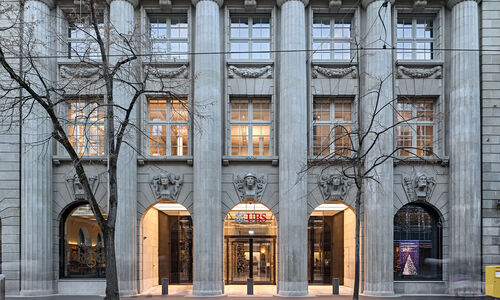The Swiss bank's quarterly profit tumbled on the year, amid millions in provisions against expected losses on loans. Its investment bank reaped rewards from volatility, while its domestic business collapsed amid the pandemic.
Zurich-based UBS second-quarter profit fell nearly 12 percent on the year to $1.23 billion, it said in a statement on Tuesday. The result was hit by $272 million in expenses for credit losses, the majority of which it took in its Swiss business.
UBS' income edged a touch lower to $7.4 billion, despite a one-third boost in revenue from its investment bank. Like smaller Swiss rival Julius Baer, UBS benefited from a trading fillip during the onset of the pandemic which spilled into the beginning of the quarter: UBS' securities unit hiked income by one-third thanks to foreign exchange, interest rate, and cash equity products.
Dark Industry Imagery
UBS' result beats a forecast of $973 million, the average of 21 analysts compiled by the bank. The boost in the three months masks longer-term economic setbacks for wealth managers, which U.S. banks including J.P. Morgan painted darkly in their results last week.
Revenue at UBS' investment bank climbed nearly ten percent to $2.27 billion because the coronavirus crisis kept trading floors busy. UBS singled out foreign exchange, interest rates, and credit products – which offset a drop in revenue from giving advice, which came to a virtual standstill in the second quarter.
Swiss Collapse
By contrast, UBS' retail and corporate business in Switzerland sank 14 percent, riddled by 104 million Swiss francs ($110 million) in provisions for future, expected losses. This followed UBS' lowering forecasts for Swiss growth, unemployment rates, and real estate prices. A drop in credit card fees and revenues from forex transactions, as Swiss clients eschewed travel and leisure spending during the pandemic, weighed on the unit's transaction-based income.
Moody's lauded the overall result as well as its higher capital, saying that UBS «will be able to live through this crisis at its current rating,» which is Aa3 for its senior unsecured debt. Credit Suisse, which enjoys a slightly sturdier rating than UBS, is due to report the quarter on July 30.
Return To Payouts?
CEO Sergio Ermotti, who leaves in three months, told «Bloomberg» he is confident UBS can make good on the second leg of its dividend for last year, which it and Credit Suisse are staggering following pressure from Switzerland's regulator. He also said UBS might return to dividends and buybacks as soon as next quarter.
UBS' results come six weeks before incoming CEO Ralph Hamers joins, and three months before he takes over from Ermotti, who has run Switzerland's largest bank since 2011. Hamers, who has little experience in wealth management, is widely expected to disrupt UBS' hidebound culture and kickstart digitization projects.
More to follow


































